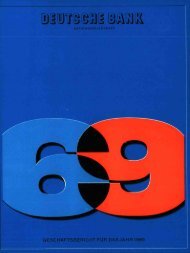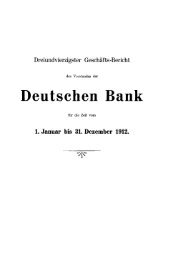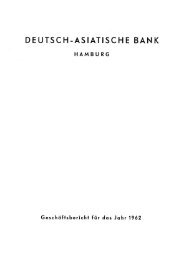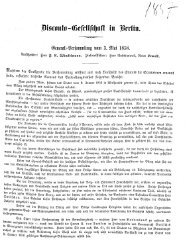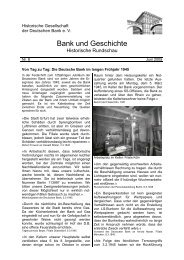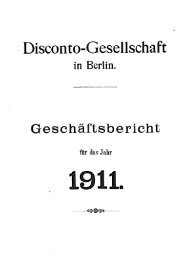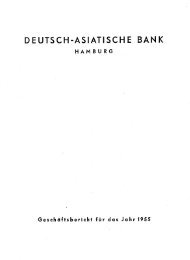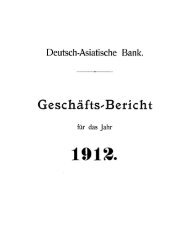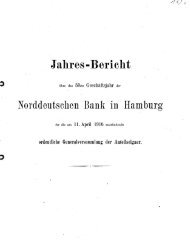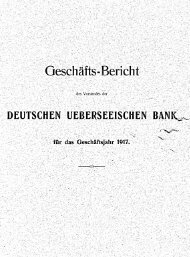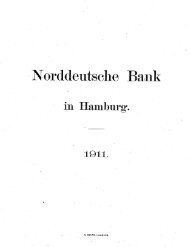Deutsche Bank AG - Historische Gesellschaft der Deutschen Bank e.V.
Deutsche Bank AG - Historische Gesellschaft der Deutschen Bank e.V.
Deutsche Bank AG - Historische Gesellschaft der Deutschen Bank e.V.
Create successful ePaper yourself
Turn your PDF publications into a flip-book with our unique Google optimized e-Paper software.
Reasons:<br />
"The declaration of the participatory certificates of the 100% subsidiary Klöckner &<br />
Co. <strong>AG</strong> to be valueless proves, after the company's enormous profits, to be abso-<br />
lutely unnecessary, at least on that scale. The voluntary cornpensation provided in<br />
August 1989corresponded to only a fraction of the value of the participatory certifi-<br />
cates. Through pure profit seeking, the Board of Managing Directors hence de-<br />
stroyed the confidence of many hundreds of srnall investors in the probity of Deut-<br />
sche <strong>Bank</strong>. The bank is using the tax advantages of DM 134 rn., for which certificate-<br />
hol<strong>der</strong>s paid, and is reaping a dividend for 1989 of rnore than 100% (tax free) for its<br />
'risk' at Klöckner & Co., while the small investors are to go empty-handed."<br />
Reply:<br />
The participatory-certificate capital of Klöckner & Co. KGaA was equity capital. Since<br />
the cornpany's losses in auturnn 1988 exceeded the entire equity capital, the extin-<br />
guishment of the rights attaching to the participatory certificates was an unavoidable<br />
legal and econornic consequence. Nevertheless, DM 112 per participatory certificate<br />
was paid to the certificate-hol<strong>der</strong>s in August 1989. This was in line with the stock rnar-<br />
ket valuation before the crisis at the cornpany became known. It was only when the<br />
bank took action that the preconditions were created for the company's recovery and<br />
hence for the payment to the certificate-hol<strong>der</strong>s. Any profit from our commitrnent -<br />
about whose size it is is not yet possible to say anthing - will merely be compensation<br />
for the risk borne by the bank.<br />
Ms. Hanneliese Appelrath, Bonn, has given notice that she will propose that ratifica-<br />
tion of the acts of rnanagernent of the Board of Managing Directors and of the share-<br />
hol<strong>der</strong>s' representatives on the Supervisory Board be refused.<br />
Reasons:<br />
"Despite growing Protests, <strong>Deutsche</strong> <strong>Bank</strong> continued its business with South<br />
Africa in 1989. In particular, it agreed in October 1989 to another rescheduling<br />
for South Africa. Despite appeals - from South African churchlea<strong>der</strong>s, among<br />
others - the rescheduling was not rnade dependent on the fulfilment of political<br />
conditions. The DGB criticized the fact that the big banks did not use their political<br />
power to bring about humane conditions in South Africa. In addition, <strong>Deutsche</strong><br />
<strong>Bank</strong> continued to provide trade finance for South Africa.<br />
The Board of Managing Directors and the capital representatives have severely<br />
damaged the bank's reputation by persisting in conducting business with South<br />
Africa."<br />
Reply:<br />
We have already stated at previous General Meetings that <strong>Deutsche</strong> <strong>Bank</strong> rejects the<br />
apartheid System. We welcome the fact that the South African government has com-<br />
menced dialogue with the representatives of the black population, and we hope - in<br />
the interest of the country and its people - that the prospects for peaceful change in<br />
South Africa will improve further. A boycott would jeopardize this developrnent and<br />
have negative repercussions for the whole population.



